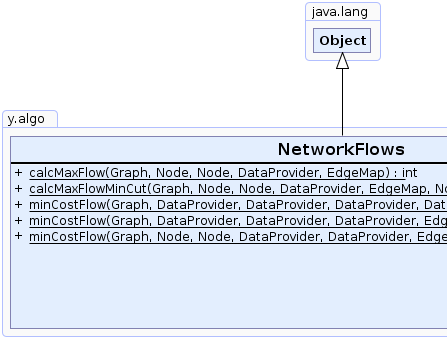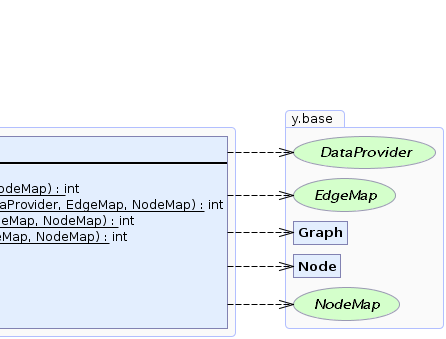 y.algo.NetworkFlows
y.algo.NetworkFlows
|
Search this API | ||||||||
| PREV CLASS NEXT CLASS | FRAMES NO FRAMES | ||||||||
| SUMMARY: NESTED | FIELD | CONSTR | METHOD | DETAIL: FIELD | CONSTR | METHOD | ||||||||
java.lang.Objecty.algo.NetworkFlows
public class NetworkFlows
This class provides sophisticated algorithms for solving classical network flow problems.
Given a directed graph in which each edge has a capacity and given a source node s and a sink node
t, find a flow of maximum value from s to t.
Given a directed graph in which each edge has a capacity and given a source node s and a sink node
t, find an s-t cut of minimum capacity (i.e., a set of edges of minimum capacity whose
removal would disconnect t from s).
Given a directed graph in which each edge has a cost and a capacity and each node has a supply or demand, find a flow of minimum total cost that satisfies the edge capacities and the node balances.
Given a directed graph in which each edge has a cost and a capacity and given a source node s and a sink node
t, find a flow of maximum value from s to t that has the minimum total cost.
 |
 |
| Method Summary | |
|---|---|
static int |
calcMaxFlow(Graph graph,
Node source,
Node sink,
DataProvider eCapDP,
EdgeMap flowEM)
Solves a maximum flow problem using the preflow-push method. |
static int |
calcMaxFlowMinCut(Graph graph,
Node source,
Node sink,
DataProvider eCapDP,
EdgeMap flowEM,
NodeMap sourceCutNM)
Solves a maximum flow problem using the preflow-push method but additionally marks all nodes that belong to the minimum cut set that is associated with the source of the network. |
static int |
minCostFlow(Graph graph,
DataProvider lCapDP,
DataProvider uCapDP,
DataProvider cost0DP,
DataProvider supplyDP,
EdgeMap flowEM,
NodeMap dualsNM)
Solves a minimum cost flow problem with a capacity scaling algorithm. |
static int |
minCostFlow(Graph graph,
DataProvider uCapDP,
DataProvider cost0DP,
DataProvider supplyDP,
EdgeMap flowEM,
NodeMap dualsNM)
Uses method minCostFlow(Graph, DataProvider, DataProvider, DataProvider, DataProvider, EdgeMap, NodeMap)
to solve a minimum cost flow problem. |
static int |
minCostFlow(Graph graph,
Node s,
Node t,
DataProvider uCapDP,
DataProvider cost0DP,
EdgeMap flowEM,
NodeMap dualsNM)
Solves a minimum cost maximum flow problem. |
| Methods inherited from class java.lang.Object |
|---|
clone, equals, finalize, getClass, hashCode, notify, notifyAll, toString, wait, wait, wait |
| Method Detail |
|---|
public static int minCostFlow(Graph graph,
DataProvider lCapDP,
DataProvider uCapDP,
DataProvider cost0DP,
DataProvider supplyDP,
EdgeMap flowEM,
NodeMap dualsNM)
This algorithm is a variant of the successive shortest path algorithm (see Ahuja,Magnanti,Orlin: Network flows,
Prentice Hall, 1993, pp.320-324). It has the pseudo-polynomial running time O(m*log U*(m+n log n))
where n is the number of nodes in the network, m the number of edges and U
the maximal edge capacity.
Edges may have infinite capacity, which is denoted by the value Integer.MAX_VALUE.
There are no restriction for the costs. In particular, they can also be negative.
graph - the given networklCapDP - the DataProvider that returns the integer lower bound for the capacity of each edge or
null if no bound is specifieduCapDP - the DataProvider that returns the integer upper bound for the capacity of each edgecost0DP - the DataProvider that returns a double value (cost) of each edgesupplyDP - the DataProvider that returns the supply/demand of each node; supply is denoted by a
positive value, demand by a negative valueflowEM - the EdgeMap that will be filled during the execution with an integer flow for each edgedualsNM - the NodeMap that will be filled during the execution with an integer value (dual value) for
each node or null if no such values occur; dual values are also referred as potentials
minCostFlow(Graph, DataProvider, DataProvider, DataProvider, EdgeMap, NodeMap),
minCostFlow(Graph, Node, Node, DataProvider, DataProvider, EdgeMap, NodeMap)
public static int minCostFlow(Graph graph,
DataProvider uCapDP,
DataProvider cost0DP,
DataProvider supplyDP,
EdgeMap flowEM,
NodeMap dualsNM)
minCostFlow(Graph, DataProvider, DataProvider, DataProvider, DataProvider, EdgeMap, NodeMap)
to solve a minimum cost flow problem.
graph - the given networkuCapDP - the DataProvider that returns the integer capacity of each edgecost0DP - the DataProvider that returns a double value (cost) for each edgesupplyDP - the DataProvider that returns the supply/demand of each node; supply is denoted by a
positive value, demand by a negative valueflowEM - the EdgeMap that will be filled during the execution with an integer flow for each edgedualsNM - the NodeMap that will be filled during the execution with an integer value (dual value) for
each node or null if no such values occur; dual values are also referred as potentials
minCostFlow(Graph, Node, Node, DataProvider, DataProvider, EdgeMap, NodeMap),
minCostFlow(Graph, DataProvider, DataProvider, DataProvider, DataProvider, EdgeMap, NodeMap)
public static int minCostFlow(Graph graph,
Node s,
Node t,
DataProvider uCapDP,
DataProvider cost0DP,
EdgeMap flowEM,
NodeMap dualsNM)
graph - the given networks - the source node of the networkt - the sink node of the networkuCapDP - the DataProvider that returns the integer capacity of each edgecost0DP - the DataProvider that returns a double value (cost) for each edgeflowEM - the EdgeMap that will be filled during the execution with an integer flow for each edgedualsNM - the NodeMap that will be filled during the execution with an integer value (dual value) for
each node or null if no such values occur; dual values are also referred as potentials
minCostFlow(Graph, DataProvider, DataProvider, DataProvider, DataProvider, EdgeMap, NodeMap),
minCostFlow(Graph, DataProvider, DataProvider, DataProvider, EdgeMap, NodeMap)
public static int calcMaxFlow(Graph graph,
Node source,
Node sink,
DataProvider eCapDP,
EdgeMap flowEM)
The worst case running time is O(mdeg * n^2 * m^(1/2)), where n is the number of
nodes in the network, m the number of edges and mdeg the maximal degree of any node.
Edges may have infinite capacity, which is denoted by the value Integer.MAX_VALUE.
graph - the given networksource - the source node of the networksink - the sink node of the networkeCapDP - the EdgeMap that returns the integer capacity for each edge. Integer.MAX_VALUE
denotes infinite capacity for an edgeflowEM - the EdgeMap that will be filled during the execution with an integer flow for each edge
calcMaxFlowMinCut(Graph, Node, Node, DataProvider, EdgeMap, NodeMap)
public static int calcMaxFlowMinCut(Graph graph,
Node source,
Node sink,
DataProvider eCapDP,
EdgeMap flowEM,
NodeMap sourceCutNM)
graph - the given networksource - the source node of the networksink - the sink node of the networkeCapDP - the EdgeMap that returns the integer capacity for each edge. Integer.MAX_VALUE
denotes infinite capacity for an edgeflowEM - the EdgeMap that will be filled during the execution with an integer flow for each edgesourceCutNM - the NodeMap that will be filled during the execution and returns a boolean value indicating
whether or not a node belongs to the cut set associated with the source of the network
calcMaxFlow(Graph, Node, Node, DataProvider, EdgeMap)
|
© Copyright 2000-2025, yWorks GmbH. All rights reserved. |
||||||||
| PREV CLASS NEXT CLASS | FRAMES NO FRAMES | ||||||||
| SUMMARY: NESTED | FIELD | CONSTR | METHOD | DETAIL: FIELD | CONSTR | METHOD | ||||||||